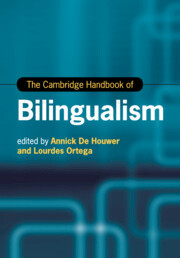The Cambridge Handbook of Bilingualism Cambridge Handbooks in Language and Linguistics Series
Langue : Anglais
Coordonnateurs : De Houwer Annick, Ortega Lourdes

A truly comprehensive survey of bilingualism, examining the learning, use, and unlearning of two or more languages across the lifespan.
The ability to speak two or more languages is a common human experience, whether for children born into bilingual families, young people enrolled in foreign language classes, or mature and older adults learning and using more than one language to meet life's needs and desires. This Handbook offers a developmentally oriented and socially contextualized survey of research into individual bilingualism, comprising the learning, use and, as the case may be, unlearning of two or more spoken and signed languages and language varieties. A wide range of topics is covered, from ideologies, policy, the law, and economics, to exposure and input, language education, measurement of bilingual abilities, attrition and forgetting, and giftedness in bilinguals. Also explored are cross- and intra-disciplinary connections with psychology, clinical linguistics, second language acquisition, education, cognitive science, neurolinguistics, contact linguistics, and sign language research.
Introduction. Learning, using and unlearning more than one language Annick De Houwer and Lourdes Ortega; Part I. Bilingual Learning and Use at Five Stages of Life: 1. Becoming bilingual in early childhood Ludovica Serratrice; 2. Bilingualism from childhood through adolescence Martha Bigelow and Penelope Collins; 3. Young bilingual adults Kellie Goncalves; 4. Bilingualism in midlife David Singleton and Simone E. Pfenninger; 5. Language and older bilinguals Mira Goral; Part II. The Larger Contexts of Bilingualism: 6. Ideologies of language, bilingualism, and monolingualism Janet M. Fuller; 7. Bilingualism and the law Philipp S. Angermeyer; 8. Language planning and policies for bilingualism Joseph Lo Bianco; 9. The economics of bilingualism Francois Grin; Part III. Contexts for Bilingual Learning and Unlearning: 10. The nature of exposure and input in early bilingualism Sharon Armon-Lotem and Natalia Meir; 11. Becoming bilingual through additive immersive programs Maria Juan-Garau and Roy Lyster; 12. Foreign language learning from early childhood to young adulthood Carmen Munoz and Nina Spada; 13. Supporting bilingualism in adult first generation migrants James Simpson; 14. Unlearning and relearning of languages from childhood to later adulthood Merel Keijzer and Kees De Bot; Part IV. The Dynamics of Bilingualism across the Lifespan: 15. The measurement of bilingual abilities Jeanine Treffers-Daller; 16. Highly proficient and gifted bilinguals Adriana Biedron and David Birdsong; 17. Language choice in bilingual interaction Annick De Houwer; 18. First language attrition: from bilingual to monolingual proficiency? Barbara Kopke; Part V. Bilingualism Research across Disciplines: 19. Bilingualism in clinical linguistics Carol Scheffner Hammer and Lisa A. Edmonds; 20. Doing and undoing bilingualism in education Ofelia Garcia and Ruanni Tupas; 21. Second language acquisition as a road to bilingualism Lourdes Ortega; 22. Bilingualism in cognitive science: the characteristics and consequences of bilingual language control Kenneth R. Paap; 23. Bilingualism in neurolinguistics: from static to dynamic approaches Arturo E. Hernandez; Part VI. Bilingual Connections: 24. Bilingualism and sign language research Gladys Tang and Felix Sze; 25. Bilingualism and bidialectalism Jean-Pierre Chevrot and Anna Ghimenton; 26. Bilingualism and language contact Suzanne Aalberse and Pieter Muysken; 27. Bilingualism and multilingualism Suzanne Quay and Simona Montanari.
Annick De Houwer is Professor of Language Acquisition and Multilingualism at the Universität Erfurt, Germany. Her book The Acquisition of Two Languages from Birth (Cambridge, 1990) constituted pioneering work in bilingual acquisition, and her 2009 textbooks Bilingual First Language Acquisition and An Introduction to Bilingual Development are used all over the world.
Lourdes Ortega is Professor of Second Language Acquisition at Georgetown University, Washington DC. A widely published scholar, she is best known for her award-winning meta-analysis of L2 instruction in 2000, her best-seller textbook Understanding Second Language Acquisition (2009, translated into Mandarin in 2016), and for championing a bilingual turn in SLA.
Lourdes Ortega is Professor of Second Language Acquisition at Georgetown University, Washington DC. A widely published scholar, she is best known for her award-winning meta-analysis of L2 instruction in 2000, her best-seller textbook Understanding Second Language Acquisition (2009, translated into Mandarin in 2016), and for championing a bilingual turn in SLA.
Date de parution : 06-2024
Ouvrage de 680 p.
Date de parution : 11-2018
Ouvrage de 678 p.
18x25.5 cm
Thème de The Cambridge Handbook of Bilingualism :
© 2024 LAVOISIER S.A.S.



